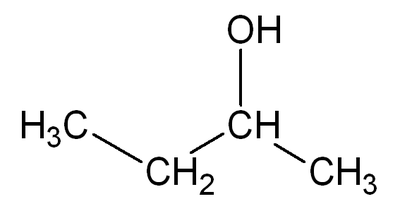Butanol
Jump to navigation
Jump to search
Basics
- It can be used as a direct Gasoline Substitute in unmodified internal combustion engines
- Butanol is far less corrosive than ethanol and can be shipped and distributed through existing pipelines and filling stations
- It is an effective Hydrogen Carrier in a Hydrogen Economy ; Reformed butanol has four more hydrogen atoms than Ethanol, resulting in a higher energy density
- Butanol is an industrial commodity, with a 370 million gallons per year market with a selling price of $3.75 per gallon.
- It can be, but does not have to be, blended (10 to 100 percent) with any fossil fuel.
- Butanol can be transported through existing pipelines for distribution.
- It can be blended with petrodiesel and with vegetable oils (where it also reduces the gel temperature point and the viscosity) to produce biodiesel. ?
- It is a very versatile fuel and fuel extender in both gasoline and diesel engines. Octane?
Production Routes
Biological
Acetone-butanol-ethanol fermentation
- Typically done via Clostridium acetobutylicum
- Any genetically modified algae/e. coli/yeast etc?
- This can be done with a starch or sugar based feedstock
- It can also be done with syngas (See Syngas Fermentation )
Catalytic
Internal Links
External Links
- The Wikipedia Page on Butanol
- The Wikipedia Page on Butanol Fuel
- The Wikipedia Page on Acetone-butanol-ethanol fermentation
- The Wikipedia Page on Celtic Renewables (A Company Making Bio-Butanol Fuel From Whiskey Wastes
- The Wikipedia Page on Gevo Inc (Supposedly making this commercially viable (also not dead unlike 2/3 of these biofuel companies from the 2000's?) ( Make a page on them later )
- Also advocates (at least somewhat; Low Till Farming / No Till Farming ) Sustainable Agriculture making it truely sustainable biomass based?
- PESwiki: Butanol
- Article: BIOBUTANOL - PRODUCTION AND PURIFICATION METHODS
- Company: Green Biologics - a lot of proprietary stuff
- EPA Registry of Isobutanol for Blending into Gasoline
- Mentions “ Butamax Advanced Biofuels LLC”
- Dated 2018
- This article on “butamax” is dated 2010
- MIGHT just be Greenwashing , but that risk aside it does seem like it is at the Pilot Plant scale TRL wise as per This Article
- A 2022 Study in “Energies” Titled “ Effectiveness of Butanol and Deposit Control Additive in Fuel to Reduce Deposits of Gasoline Direct Injection Engine Injectors”
